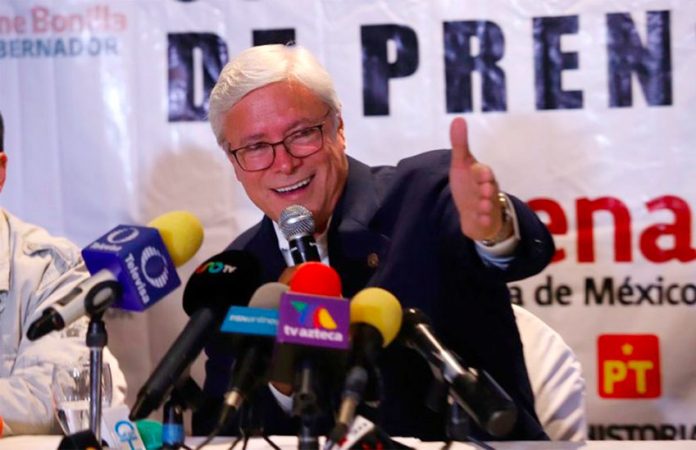The Baja California Congress yesterday ratified a reform that extends the term of the next state governor, Jaime Bonilla, from two years to five.
Lawmakers first passed legislation to extend the Morena party governor-elect’s term two weeks ago, a move that was condemned by the leadership of the opposition National Action Party (PAN), several federal deputies and senators and a National Electoral Institute councilor, among others.
Bonilla was elected on June 2 and will take office on November 1. Instead of concluding his term in 2021, it now appears likely that he will remain in office until 2024.
Supporters of the extended term have argued that limiting it to two years would be too costly, but opponents say voters went to the polls on the understanding that they were electing a governor for two years.
The purpose of the shortened term was to align the state’s election for governor with the federal mid-term elections.
Ratification of the extended term took place in a hastily-organized special session of Congress held behind closed doors at the Playas de Rosarito municipal palace, located about 200 kilometers from the Congress building in Mexicali.
Congress president Benjamín Gómez convened a meeting at 3:00pm to discuss a petition sent by the federal Congress that asked state lawmakers to reconsider the legislation that extends the next governor’s term.
After the petition was discussed and declared to be in violation of the sovereignty of Baja California, it was announced that a second extraordinary session would immediately take place to ratify the extended term.
Members of the Morena, Labor and Transformemos parties supported ratification as did former deputies of the National Action and Democratic Revolutionary parties who now sit as independents as a result of their backing of the legislation.
The Congress will ask current Governor Francisco Vega de Lamadrid to promulgate the reform by publishing it in the official gazette.
If the PAN governor refuses to do so, as he has indicated he will, Congress will seek to publish the reform directly as permitted by the constitution.
Only a Supreme Court ruling could overrule the reform.
The National Human Rights Commission said last week that it would analyze the viability of filing a claim against the constitutionality of the law, while PAN national president Marko Cortés said on Twitter yesterday that his party will initiate action in the Supreme Court as a result of the decision taken “in the dark” and “outside” Baja California’s official “legislative precinct.”
In addition to criticizing the reform, some state lawmakers expressed their disapproval of the way in which yesterday’s meetings were convened.
“. . . I don’t feel comfortable with a notice [for a session of Congress] that didn’t reach me . . . I found out that the legislature would meet through third parties and the press,” said PAN Deputy Miguel Antonio Osuna Millán.
Another PAN deputy, Eva María Vázquez, said in an interview that the session was “convened illegally.”
She also described the reform as “illegal” and the whole situation as “regrettable.”
President López Obrador last week ruled out any possibility that he would intervene in the matter despite complaints that the extension of the governor’s term is undemocratic and/or illegal.
“It’s my opinion that the relevant authority should settle [the issue] . . . the president’s office won’t interfere in these matters,” he said.
The man at the center of the controversy said in a statement that he would respect any decision handed down by the Supreme Court with respect to the length of his term.
“Now it’s five years but it could change. Independently of that, we’re going to work the same way every day . . . We’re going to move ahead with our projects,” governor-elect Bonilla said.
Critics of the decision to extend his term should wait to see the outcome of any legal challenges, he said.
“Let the Supreme Court decide, but why so much scandal?”
Source: El Financiero (sp), La Jornada (sp), El Universal (sp), Milenio (sp)
